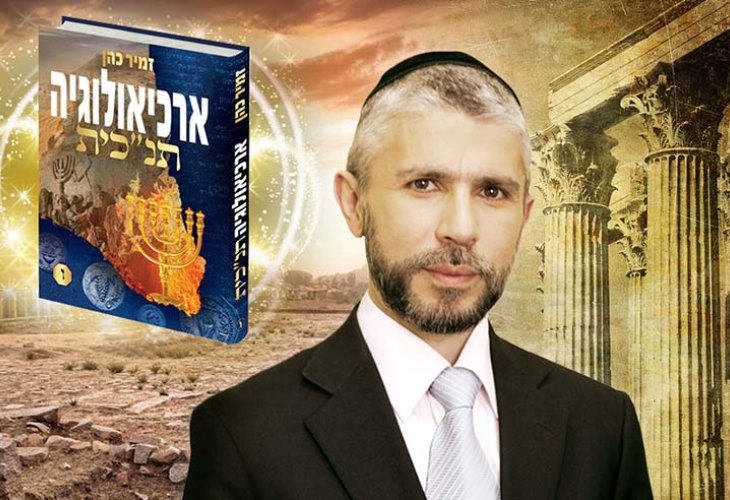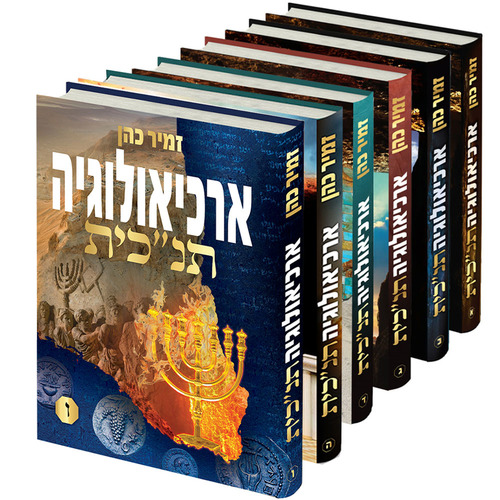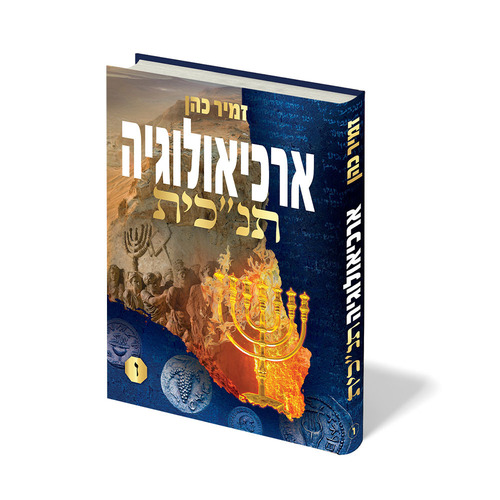Rabbi Zamir Cohen Concludes the 'Biblical Archaeology' Series: 'I Never Imagined We'd Reach Six Volumes'
Why are archaeologists who once claimed the Bible was inaccurate becoming less vocal today? Is it possible to prove and gain faith through findings from the earth, and how should one approach discoveries that seemingly contradict the Bible? Rabbi Zamir speaks on the release of the sixth and final volume in the 'Biblical Archaeology' series.

At the beginning of the work on the 'Biblical Archaeology' series, no one, including Rabbi Zamir Cohen, had any idea that the project would eventually expand to encompass six complete volumes. The rabbi recalls that he estimated these findings would fill a reasonable number of books, but over time, the fascinating discoveries and documentation accumulated, resulting in these magnificent volumes, presented in an impressive and luxurious format, as is typical of the rabbi's books.
These days, the sixth volume in the series is being published, a series that has already made waves both in Israel and abroad (and has also been translated into various languages). This time, the focus is on the period of the destruction of the Second Temple. Topics range from the pilgrimage to Jerusalem, the Great Revolt, the conquest of Jerusalem and the Temple's destruction, the fall of Masada, Betar, and the Bar Kokhba revolt, to the discovery of the sacred scrolls and the tefillin found in the Judean Desert.
"The subject of biblical archaeology is one that captivates endless curiosity among both Jewish and non-Jewish people," summarizes the rabbi on this massive undertaking. "While the Bible is not a history book per se but rather a guide on how to live according to Hashem's will for Israel and the nations of the world, it does recount the history of humankind from the first human up to the end of the prophets. L'chaim, in Parashat Bereshit, writes about the verse 'this is the book of human lineage,' explaining that it refers to the entire Torah, which is a book of human history. And why did the Torah detail human history? To convey a message to anyone who has doubts about the Torah's authenticity, showing the accurate record of humanity's history, allowing anyone seeking truth who investigates historical events to see that all the details in the Torah are completely reliable."
So why do we "need" archaeological evidence?
"As noted, the Torah is not intended as a historical record; that isn't its purpose or goal. It doesn't require archaeological discoveries for validation itself but serves those who are perplexed by questions—archaeology provides clear-cut findings that completely align with the biblical narrative. For instance, Joseph in Egypt. The Bible describes how he was made viceroy, and after excavations in Egypt's pyramids, they found illustrations depicting how one would be elevated in status in Egypt—standing before the king, receiving a golden chain around his neck, matching exactly the protocol described in the Torah. An example of this is the word 'rebid,' which through archaeological findings we learned isn't a thin chain but a broad collar, as portrayed in illustrations and found in the tomb of the Egyptian Pharaoh Tutankhamun, visible in the first volume of 'Biblical Archaeology.' This is just one example of countless that proves how archaeology validates even minute Torah details as being true to their time and context. Anyone studying the Torah in depth feels inherently that it is a Torah of truth with no distortion or falsification."

What else besides archaeological findings?
"The Torah is full of scientific information that has only recently been discovered by researchers. As elaborated in the 'Revolution' book series, the Torah involves secrets of letters and astonishing codes that only someone who foresaw the future or possessed superhuman wisdom could have embedded so intricately, alongside precise prophecies that materialized in detail. All these prove that the Torah is divine, in addition to the very event of receiving the Torah at Mount Sinai before the entire nation—an event so foundational it's impossible to implant it into history if it hadn't occurred. The entire span of history, from that day backward, is fully known with names of people and places, and all waypoints from then to now were already known up to the time of the Exodus from Egypt. An interesting note: one of the non-Jewish philosophers said the only book he finds fully credible among religious texts is the Bible because it is the only one not afraid to criticize its leaders, like how Moses was reprimanded by Hashem. All other religions merely praise their 'perfect person,' but the Torah is a Torah of truth, even specifying where Hashem admonished the greatest leaders. To him, this aspect also underscores the Torah's reliability."
Was it initially planned for six volumes to be released in the series?
"I never imagined we'd reach six books. The plan was for individual books as needed. It wasn't clear how many, but certainly not six. As some historical details weren't widely known and there was a necessity to elaborate on them, another volume had to be added each time. This way, we could progress step by step, from the dawn of humanity to the Great Revolt after the destruction of the Second Temple. A timeline appears at the beginning of each chapter in all the volumes, allowing everyone to know at what historical point we are."
What distinguishes Volume 6, and what topics does it cover?
"Volume 6 mainly focuses on the Second Temple period, discoveries around the Temple area in Jerusalem, and other locations in the country. From the Romans' war with Israel, the conquest of Jerusalem, and the burning of the Temple to findings from that period, such as sacred writings and pairs of tefillin found in the Qumran caves near the Dead Sea, and letters from Bar Kokhba to his men. Due to the unique climate there, they have been preserved until today—a wonder in itself, also illustrating how the Jewish people maintained their tradition of wearing tefillin with the four scriptures from pure animal skin, as also reflected in Bar Kokhba's letters and others. The change in law observed today is the same our ancestors adhered to in those days."
 The new volume of the ''Biblical Archaeology'' series
The new volume of the ''Biblical Archaeology'' seriesIs there current relevance to the state of the Jewish people today reflected in the new book, or at least indirectly?
"It discusses sects that diverged from the Jewish path. Just as there are reformists and various sects today, there were then, too. The era of destruction, characterized by baseless hatred—from historical writings and findings from the earth, one can see the results of the baseless hatred among the groups in Jerusalem before the Temple's destruction, which led to the ruin, exactly as Chazal stated."
Many archaeologists today in Israel do not regard archaeology and the Bible as two reliable, inseparable subjects. This is quite like how science views faith and the existence of Hashem. Are there, like the rising number of scientists who believe, changes in recent years in the archaeological field toward faith in the biblical description?
"Since the establishment of the state, archaeologists have split into two groups. There are the archaeologists, who are enthusiastic believers in the Bible, like Prof. Yigael Yadin, who testified that he felt great pleasure digging with a trowel in one hand, holding a Bible in the other, finding discoveries one by one, in line with what is written in the Bible. He noted that in some places, based on biblical descriptions, he told the workers—Jews who immigrated from North Africa working on the digs—‘Dig here, you'll find a wall gate.’ And so it was. He precisely described how things would look, and they wondered how he knew. But he stated that he knew that from the scriptures along with the findings already uncovered.
"There are other archaeologists who excavated in Jerusalem and many places across the country, finding artifacts from when the Israelites entered the land, exactly as the Torah records, ‘You shall break down their altars...etc.’ Many such artifacts were found precisely in layers matching the time of the Israelites' entry into the land under Joshua, with houses of idol worship whose idols were shattered. One can see in the book images of broken idols found in the excavations; remnants of burned trademark idol houses, all in locations the Torah identifies as conquered by the Israelites. Some archaeologists, honest and true to themselves, adhered to the Bible and marveled at each new discovery.
"Conversely, there are some archaeologists at Tel Aviv University who have become less active in recent years after new findings debunked entire books they wrote, claiming the Bible supposedly exaggerated or inflated certain kings beyond what they truly were. But as the verse in Psalms says, 'Truth will sprout from the ground' (Chapter 85, Verse 12). The truth emerges from the earth. Recently, new discoveries have revealed their errors, hence these days, one hears less from archaeologists who dared to speak against the Bible. It's important to know that some belong to groups considering the Land of Israel as belonging to the Muslims. When there is no faith in the Torah, it also influences political views. By the way, some of them received prizes from European foundations abroad that are hostile to Israel. As soon as a Jewish professor argues the Bible isn't accurate about details, those funds seize on such claims eagerly, and it's likely this encouraged those scholars to reach such unfounded conclusions and to disdain the words of the Bible. It results from a heretical approach and sometimes a desire to please those anti-Jewish bodies."
Moving the Timeline
The abundance of evidence and photos in the book is certainly impressive, no doubt. However, I can't hold back and ask the rabbi: what happens if evidence comes to the rabbi's attention that seemingly contradicts the Bible and points to different times than described there?
"Some archaeologists, due to a mistake in Egyptian chronology, presented findings they don't think match the biblical account of the Exodus," the rabbi says. "But as researcher Yehoshua Etzion has already proven in his book 'The Lost Bible' among others, once you adjust the timeline attributed to the Pharaohs' era, everything aligns perfectly, one to one. So, in his opinion, as well as that of other researchers, there is an error in matching the events uncovered in archaeology with the periods others assign to them. And once the timeline is adjusted to what it truly should be—everything falls into place ideally: the dating of Joseph in Egypt, Israel’s enslavement, the Exodus, the wars of that period, and so forth. So in the end, all the findings support the Bible one-to-one."
Some argue that faith is faith, and it's hard to provide evidence—including archaeological—to support faith. What is the rabbi's view on this statement?
"There is a common misconception among many that the word ‘faith’ means ‘doubt’. This error arises because people are used to saying when asked if someone is at home, ‘I believe so,’ meaning ‘I think’ or ‘I tend to say.’ And that is a big mistake. Because in the original Hebrew of the Torah, the word faith means something entirely reliable.
"There is a verse, ‘And I will fasten him as a nail in a sure place.’ A sure place means a stable one. When a person lends a huge amount of money to a friend and is asked in surprise ‘why did you lend it?’ and answers ‘I believe he will return it to me’, it doesn’t mean he is doubtful but 100% sure. If he wasn’t certain, he wouldn’t lend the amount. In the Torah, we see when Abraham was very old and Hashem told him ‘Look now toward heaven and count the stars... so shall your offspring be’, it says after that ‘And he believed in the Lord’, which means he had full trust, not that he just found out there is a Creator. He knew that before. He talked to Him and brought innumerable individuals to faith in one God. But the word faith means that after knowing there is a Creator, a person puts his trust in Him and relies on Him, so that even if things aren't lining up as he wishes right now, he trusts in Hashem that everything is surely for the good and that all the commandments are for man's benefit. That’s the definition of faith – placing trust. But whether the Torah is from the heavens and whether there is a Creator, that’s not faith but knowledge—something that can be intellectually proven, reaching clear conclusions."
Are there more volumes expected in the Biblical Archaeology series, or is this the final one? And in general, what is the next book by the rabbi to be published?
"Volume 6 is the last in the series, and the book now in progress, G-d willing, is 'Maaseh Bereshit' on the first two chapters of Genesis. There are those who studied the scriptures in translation, which didn’t differentiate the fine and wonderful nuances unique to the Torah, like the difference between creation, forming, and making. Since many words and others were translated without knowing the differences, mountains of questions arose. This book will integrate the words of Chazal and the midrashim into clarifying the texts, along with the findings of scientific discoveries in our generation, proving that the Torah is divine and shedding light on the narrative of creation."
To purchase the "Biblical Archaeology" books at Hidabroot Shops click here, or click to purchase the new book, Biblical Archaeology Volume 6. You can also contact Hidabroot Shops at 073-222-12-50

